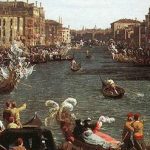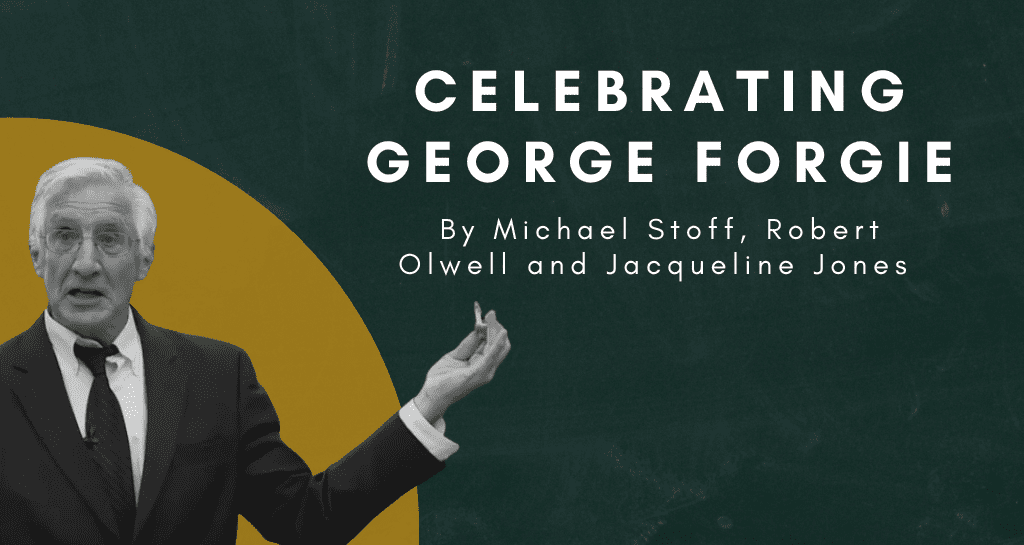
From the editors:
The Department of History at the University of Texas at Austin has been honored by its association with groundbreaking scholars, teachers, and public intellectuals. George Forgie, who retired recently, is one of them. He is an extraordinary historian, a truly remarkable teacher, and a beloved colleague who influenced generations of students. Here, we present three tributes from colleagues who know George well.
On research – by Robert Olwell
On teaching – by Michael B. Stoff
On George – by Jacqueline Jones
Reminiscences of Professor George Forgie on His Retirement
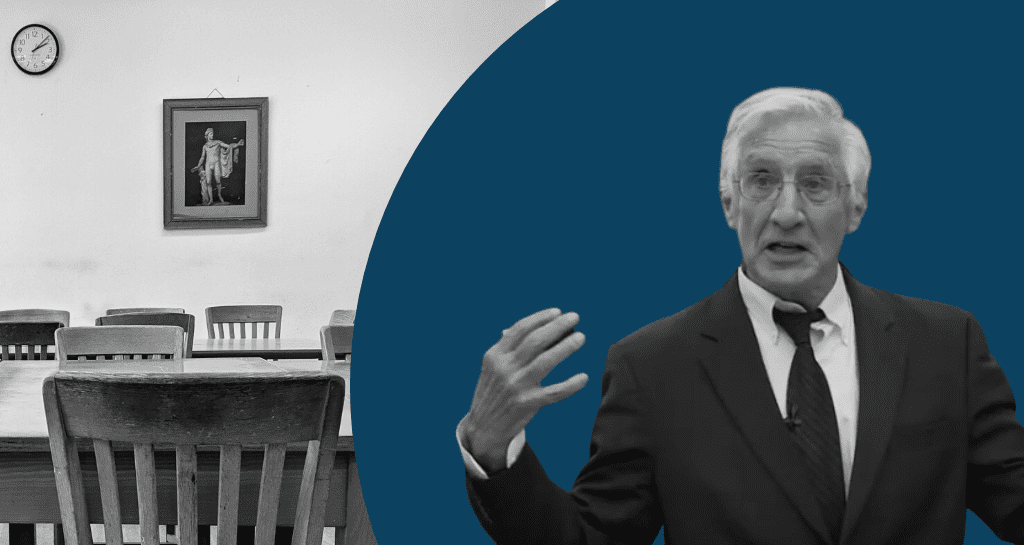
By Michael B. Stoff
It is a pleasure to feature my colleague and friend George Forgie. George has been a valued member of our department for nearly half a century. He’s served as associate chair, law advisor, and committee member. His award-winning scholarship has earned him the admiration of his colleagues both at UT and across the nation. He’s also been a careful reader and editor of the scholarship of others, who’ve looked to him for his vast knowledge, his studied eye, and his relentless logic for advice. As important, he’s won virtually every teaching award at the University of Texas at Austin as well as the system-wide Regents Outstanding Teaching Award. In recognition of that record, he was part of the inaugural group of inductees in the Academy of Distinguished Teachers, an honor reserved for those very few professors considered by students and colleagues as the University’s finest. There is no better teacher here and, I suspect, anywhere else.
George’s scholarly work first focused on explaining why and how the pre-Civil War generation ended up in a fight that broke the republic to which they had dedicated their lives. Based on his dissertation, which won the Allan Nevins Prize, Patricide in the House Divided: A Psychological Study of Lincoln and His Generation remains one of the most creative and insightful studies of how the Union came undone. Prodigiously researched, cogently argued, and deftly employing psychological theory, the book examined the generation of leaders born in the early days of the Republic and by the 1850s in control of the national house as it crumbled around them. In his New York Review of Books essay, Pulitzer Prize-winning historian David Brion Davis called it “one of the most ambitious, ingenious, and sophisticated works of psychohistory yet to appear” and rightly saw it as challenging “an entire tradition of American historiography.” George’s current work, soon to be published by Oxford University Press, continues to explore the Civil War by trying to explain why the North cared if the South left the Union and fought a war to bring it back. After all, not every national parting of ways has led to civil war.
A professor’s job is not only to research and write but to teach as well, and here George was a master. In a department that prides itself on teaching, George Forgie defines pedagogical excellence. More than a few members of the history department have confessed to me their envy of his talents in the classroom. I myself have attended some of his lectures, sometimes to evaluate his teaching, other times simply to see him work—and to learn from him as well. Sitting in a packed hall (and his classes were usually packed), hearing his commanding voice, recognizing his easy grasp of the complexities of history was to be in the presence of a classroom virtuoso. His lectures were an elegant brew of information and insights that reflected the historian’s passion for specificity and the undergraduate’s need for order. Each one had its own symmetry and, more important, a clear, sophisticated point. He barely looked at his notes, with the result that his lectures always seemed fresh. It may well have been so, for he worked not from detailed outlines but from piles of notes that he assimilated before each lecture. And he was forever adding to those notes, shifting emphasis, stressing new scholarship, searching for the telling anecdote that could breathe life into an abstraction. (I made a point of attending the same lecture for two years in a row. To my surprise the lectures were different, even though they covered precisely the same topic!)
A quick glance at his teaching evaluations reveals the esteem in which his students held him. “Excellent,” “superb,” “the best lecturer I’ve ever had,” and, perhaps the highest undergraduate compliment of all, “Forgie rocks” regularly could be found among the hand-written comments on these evaluations and on other, more informal assessments that used to appear on what students call the “Slam Table” on the West Mall. Forgie, I should add, was never slammed but lionized. Students acknowledged that he was as demanding as he was rigorous. They nonetheless flocked to his courses, whether they were history majors or not. Once there, they stayed, often after class to continue discussions begun during it. He regularly reserved the last 15 minutes of class for discussion and released those students not interested in talking or listening to anyone other than Forgie. Many remain behind.
There was no razzle or technological dazzle in Forgie. Instead, we had a professor in the classical tradition whose clarity, personal charisma, learnedness, scholarly balance, and provocation of genuine thought marked him as a master teacher. Thank goodness! We were fortunate to have had him at our university.
One further note: I know George not simply as an esteemed colleague, an admired teacher, and a sagacious scholar but as a treasured friend. Over the years, we’ve had countless dinners and endless conversation about topics as varied as contemporary politics, old and new films, historical conundrums of all kinds, teaching at every level and—always—who’s going to pay the dinner bill. His careful accounting of the latter never left a doubt over who owed what. And on that score, I can say that I owe him more than I can ever repay for decades of friendship, laughter and support. Enjoy your retirement, old friend. You deserve it!
Michael B. Stoff, Associate Professor of History Emeritus, UT Regents & University Distinguished Teaching Professor
Fathers and Sons: An appreciation of George Forgie’s Patricide in the House Divided: A Psychological Interpretation of Lincoln and his Age
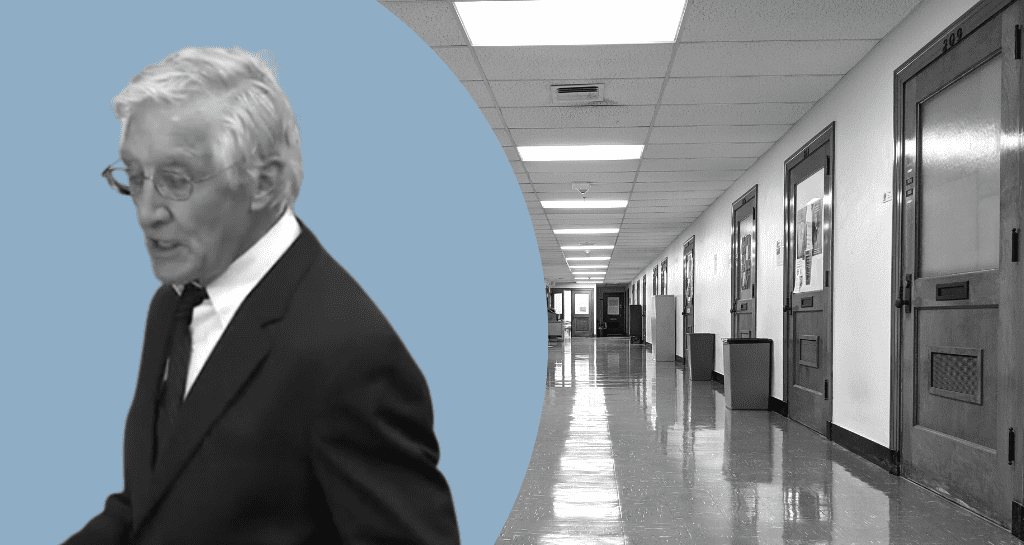
By Robert Olwell
In my first semester in graduate school I took a colloquium on early American Political history. Among an armload of rather dry political studies, George Forgie’s Patricide in the House Divided was a breath of fresh air (or perhaps a guilty pleasure). Rather than a chronicle political treatises and speeches, George drew evidence from literature, history, and philosophy as well as, of course, politics, and wove a provocative and wholly original interpretation of pre-civil politics perceived through the prism of psychology. George’s key insight was that the ambitious men of Lincoln’s cohort faced a peculiar predicament. By the time they came of age in the second quarter of the 19th century, the heroic work of winning independence and creating the American republic was completed. They were left with the decidedly unheroic chore of being the caretakers of what their predecessors had built. The members of this “post-heroic” generation mouthed the filiopietistic homilies that were expected of them. But, George argued, because they could see no outlet for their own ambition, they also repressed an almost oedipal resentment at their “fore-fathers” for having taken all the glory. Seen through this lens, the familial and domestic metaphors of the era, such as calling the revolutionary generation the “founding fathers,” and likening the nation to a “house,” take on new meaning, and the political strife of the period becomes a psychodrama.
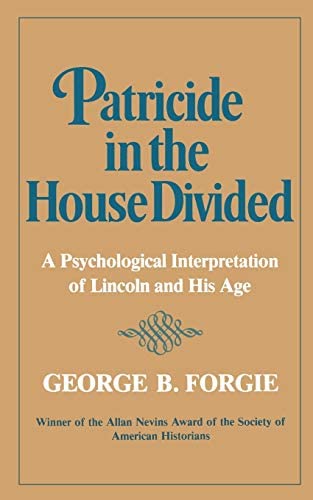
George makes Lincoln the central figure in his study. Not only was he the most significant politician of the era, but many of his writings are extremely revealing about his (and his generation’s) inner conflict. A rich vein is a talk Lincoln gave to a “Young Men’s Lyceum” when he was still an obscure member of the Illinois state legislature. In the speech, young Lincoln laid out the conundrum faced by ambitious men of his generation. A frustrated desire for distinction and achievement could tempt the “sons” to rebel against their “founding fathers,” Lincoln declared (obviously describing himself), just as the revolutionary generation had once rebelled against their own tyrannical father, the king. But, Lincoln warned, by destroying what the fathers had built, such a course of action would lead not to fame but to infamy. However, by resisting against his brothers’ rebellion, a dutiful son could earn renown (perhaps even equaling that of the “fathers”) by preserving and restoring the national “house” for a grateful posterity.
Applying this script to the political events of the 1850s and 1860s casts Stephen Douglas and the proponents of secession in the roles of the “bad” siblings and Lincoln as the “good” son. Events then play out like a Greek tragedy. In 1854, when Douglass, a Senator from Illinois, pushed an act through Congress that allowed slavery in the remainder of the Louisiana Purchase, many northerners were outraged. Lincoln, a one-term congressman since become successful lawyer, reentered politics to combat what he described as a betrayal of the “fathers’” intent to contain the expansion of slavery and set it on the road to extinction. As a leader of the new Republican Party, Lincoln first worked to prevent Douglas from becoming president and then was eventually elected to the White House himself. Afterwards, when secessionists in slaveholding states sought to pull down the house the fathers had built, Lincoln took actions that helped to ignite the civil war and then led the nation through a bloody conflict often described as a fight of “brother against brother.” By 1865, a virtuous fratricide had defeated the attempted patricide (although in this case, it was Abel who murdered Cain). The nation had a “new birth of freedom” (with Lincoln as the father) and the “house divided” was repaired and saved. In psychological terms, ego had conquered id.
My brief encapsulation of the book cannot do justice to the originality of George’s argument, the breadth of his sources, the brio of his prose, and his many ingenious connections and conjectures. After reading his book, I never read the Gettysburg Address, or Lincoln’s speeches at his first and especially, second, inaugurals in the same way. Likewise, it is astonishing how often the language and metaphors of fathers, families, and households appear in the discourse of the period once you start to notice them and infuse them with meaning. George’s book is still on my office bookshelf. It continues to shape my understanding of how Americans in the mid-19th-century, from Lincoln and Douglas to Emerson and Thoreau, imagined themselves in relation to time and to history as well as to their families and fathers (both actual and metaphorical).
Some things you might not know about George Forgie
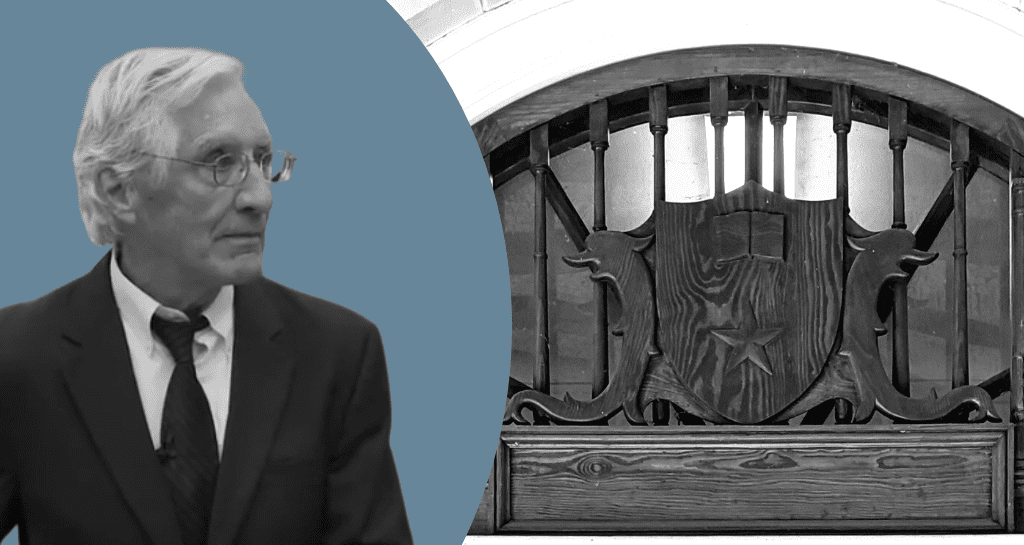
By Jacqueline Jones
Here are some things about George Forgie that you might not know:
–He was a regular runner at the annual ten-mile Austin Taco Trot. Catching a glimpse of George in the race has been known to prompt other runners to start up an animated discussion about him as the best professor they ever had at UT—and to continue that discussion, trading stories, as they dash down the street. These FoGs (Fans of George) inevitably leave older, more winded runners behind, somewhat envious of his extraordinary success in the classroom.
–He was a finalist in the New Yorker‘s September 2018 cartoon caption contest.
–He starred in a promotional spot for the new UT Longhorn Network c. 2011. The short video featured George lecturing to a hall full of student-actors. When he asked a question about the American Revolution, a student stood up and proudly answered correctly. It was the cue for some portion of the UT marching band to enter the hall playing a rousing “Eyes of Texas” at full volume–presumably to celebrate the brilliance of this particular student, and of all UT students.
Shooting this spot took a full day. In the morning, a professional make-up artist (who had worked with several Hollywood celebrities, including Johnny Depp) applied George’s make-up (though he had no cinematic close-up). Eventually the video was whittled down to a mere 15 seconds or so, but George had achieved Longhorn stardom to rival any celebrated quarterback.
And no wonder. George snagged this gig in a high-values-production video (if not a feature film) because he is a beloved UT teacher. I never attended one of George’s lectures, but the reasons he inspires such admiration are clear from any casual conversation with him. He has a droll, dry wit. He is engaged, curious to hear what you have to say and eager to hear more. He has an encyclopedic knowledge of American political history and is quick to offer precedents, analogies, and quotes from past luminaries relevant to whatever is going on in the world today.
George’s courses on the American Revolution and the Civil War are legendary. On the latter topic, he has immersed himself in a truly impressive amount of material. Which brings me to his current research.
We all know that over the generations, the American Civil War has remained an enduring subject of fascination for historians. Authors of an estimated 60,000 (and counting) books and countless articles have considered virtually every conceivable topic related to the conflict. It is the rare scholar indeed who can offer a fresh perspective on the war’s overall meaning; but George is doing just that.
He is in the process of looking at the unfolding of the war years from the viewpoint of people who lived through that terrible time. Too often we assume that the way the war was won—with the Confederate states reintegrated into the Union, and the institution of slavery destroyed—conformed to the wishes and expectations of Union politicians, military leaders, writers, clergy, and other opinion-makers. However, from 1861 onward in the North, debates raged over what “saving the Union” should or could mean, given the South’s stubborn determination to preserve the institution of slavery.
Northerners produced massive amounts of written material in the form of political speeches and debates, campaign harangues, newspaper editorials, sermons, magazine articles, diaries, correspondence, and pamphlets. By sifting through this material George can discern wartime objectives, variously defined in the moment. Several competing groups tried to sort out the territorial, political, economic, and moral dimensions of the conflict, with some groups emphasizing one of these factors more than the others. Could the Union survive with its territory intact, the Confederates chastened, but slavery preserved? Was the war worth fighting if the white South agreed to surrender but made peace contingent upon their ability to nullify federal policies and laws?
By delving into these debates, George reminds us that the outcome of the conflict was contingent on many complicated factors that we tend to elide today in favor of a more linear narrative of Union triumph.
My work has benefited from George’s scholarship in specific ways. To cite one example: While I was writing about southern planters who forcibly removed their enslaved workforces to Texas during the Civil War, he reminded me that not all Americans at the time saw President Lincoln’s Emancipation Proclamation as a sign that the purpose of the war was now to end the “peculiar institution.” Some argued that the proclamation was a military measure that Congress could easily reverse if and when the South won the war. Others suggested that the Supreme Court could and would declare the measure unconstitutional. And there were some Texas slaveholders who believed that regardless of the victor, the U. S. federal government would remain too weak to interfere with the institution of human bondage in the Lone Star state.
It’s clear to me that George is in the process of making an extraordinary contribution to Civil War history. As a researcher, he has proved indefatigable in ferreting out a vast number and variety of printed and archival sources. As a scholar, he has proved insightful in categorizing and analyzing a cacophony of Northern voices, men and women seeking to capture the attention of the public and of Lincoln himself.
One of the reasons George is such a great teacher is his command of an extraordinarily rich body of material related to American history. Another is his profound respect for his students—indeed, for all his listeners and conversationalists, whether students, friends, or colleagues. George represents the best in teaching and in humanistic pursuits in general, friendship included. Congratulations on your retirement, George!


